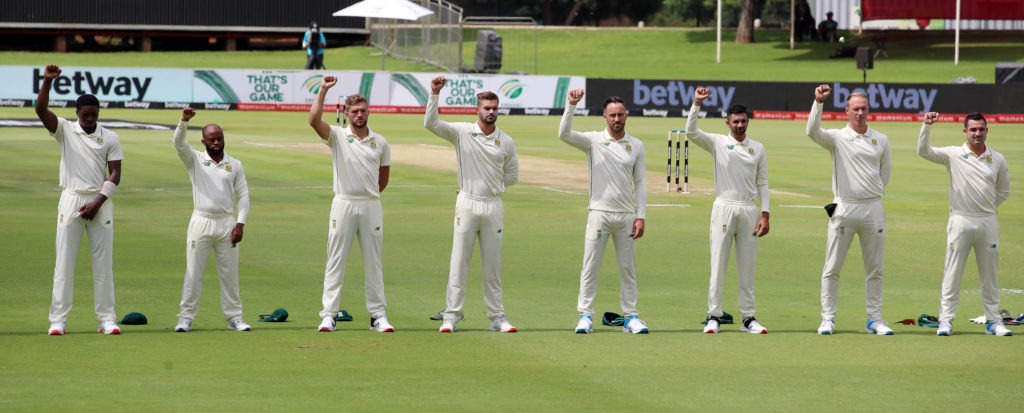The Proteas have completely botched their efforts to make a strong social justice stance writes SA Cricket Magazine editor Ryan Vrede.
I thought the cringeworthy raised fist prior to the start of play at SuperSport Park would be the Proteas’ rock bottom as far as their efforts to show solidarity with the global movement for change. It wasn’t.
Today at the Wanderers they abandoned the raised fist altogether, surely signalling the end of their disastrous efforts to navigate this issue. They can’t embarrass themselves further.
The history of this would be hilarious if it wasn’t so desperately important. Prior to the start of the Test season, the Proteas, who hadn’t played since kneeling became a sign of solidarity with the Black Lives Matter Movement across a myriad sporting codes, announced they had taken a ‘team decision’ not to kneel. They explained that they had shifted their attention to raising awareness around gender-based violence in South Africa.
Kagiso Rabada was the first Proteas’ player offered to the media after coach Mark Boucher informed the media of the decision not to kneel in the England series. Rabada was asked about this ‘team decision’ and couldn’t have looked or sounded more awkward. One sensed he wanted to say more, but felt obliged to toe the party line. He kept stressing that he supports the Black Lives Matter movement, as if to drive home the message that privately he doesn’t agree with the decision not to kneel.
Later that week Rassie Van der Dussen, who has shown support for the BLM movement, was asked about the decision not to kneel. CSA’s media manager interjected before he could answer, asserting that no such questions would be allowed, as the team has ‘drawn a line under the issue’.
I argued at the time that if the Proteas have moved from a place of symbolic support to actions that help to create equal opportunities for all – the cornerstone of the movement – then we needed to see this action. We never have.
I also argued that each player should be allowed to act on their convictions. Those with whom the movement resonates with should kneel (or express their symbolic support in whatever way they chose to). Those with whom the movement’s message doesn’t resonate, should be allowed to stay standing without anyone making a moral judgement on them.
I still feel this way. One should be free to exercise one’s free will on issues as important as this.
Two weeks ago, Cricket South Africa’s Interim Board released a statement urging the Proteas to rethink their position on this issue. Then last week CSA’s media department sent out a lengthy press release detailing why they have chosen to reform their stance on kneeling, and why raising a fist made more sense in a South African context.
I thought it was sound rationale and, despite being averse to forcing all players to raise a fist, was pleased they had thought about the issue in more detail than it appeared they had prior to the England series. I was dismayed at the awkwardness with which the team raised their fists, but chalked it down to it being the first time they did it, fully expecting things to look more natural in Johannesburg.
Instead the gesture was completely absent, without any explanation for this course of action. In the absence of an explanation it looks bad for the Proteas, leaving this open to interpretation. At best it looks as if raising a fist at SuperSport Park was an engineered move to appease the Interim Board. At worst it looks like they have zero appreciation for the significance of a social justice issue that has been thrust afresh into global consciousness, through the catalytic effect the murder of George Floyd had.
Again, I don’t believe in forcing anyone to show support for a movement that doesn’t resonate with them. But I do know that there are a group of Proteas players who want to have the option of doing so.
To deny them this opportunity strongly suggests that groupthink is masquerading as competent leadership. It doesn’t help that the the three most powerful men in South African cricket – director of cricket Graeme Smith, coach Boucher and captain Quinton de Kock – are all white. And while they may have the ability to empathise with racial demographics affected by a lack of equal opportunities, they have no lived experience and thus will never have a full appreciation for its importance in a social justice context.
It’s time the Interim Board intervenes on this issue rather than issuing suggestions. Left to their own devices the Proteas team and team management have made a mess of what should be two simple options: show support if you want to, don’t if the movement and message doesn’t resonate with you.







